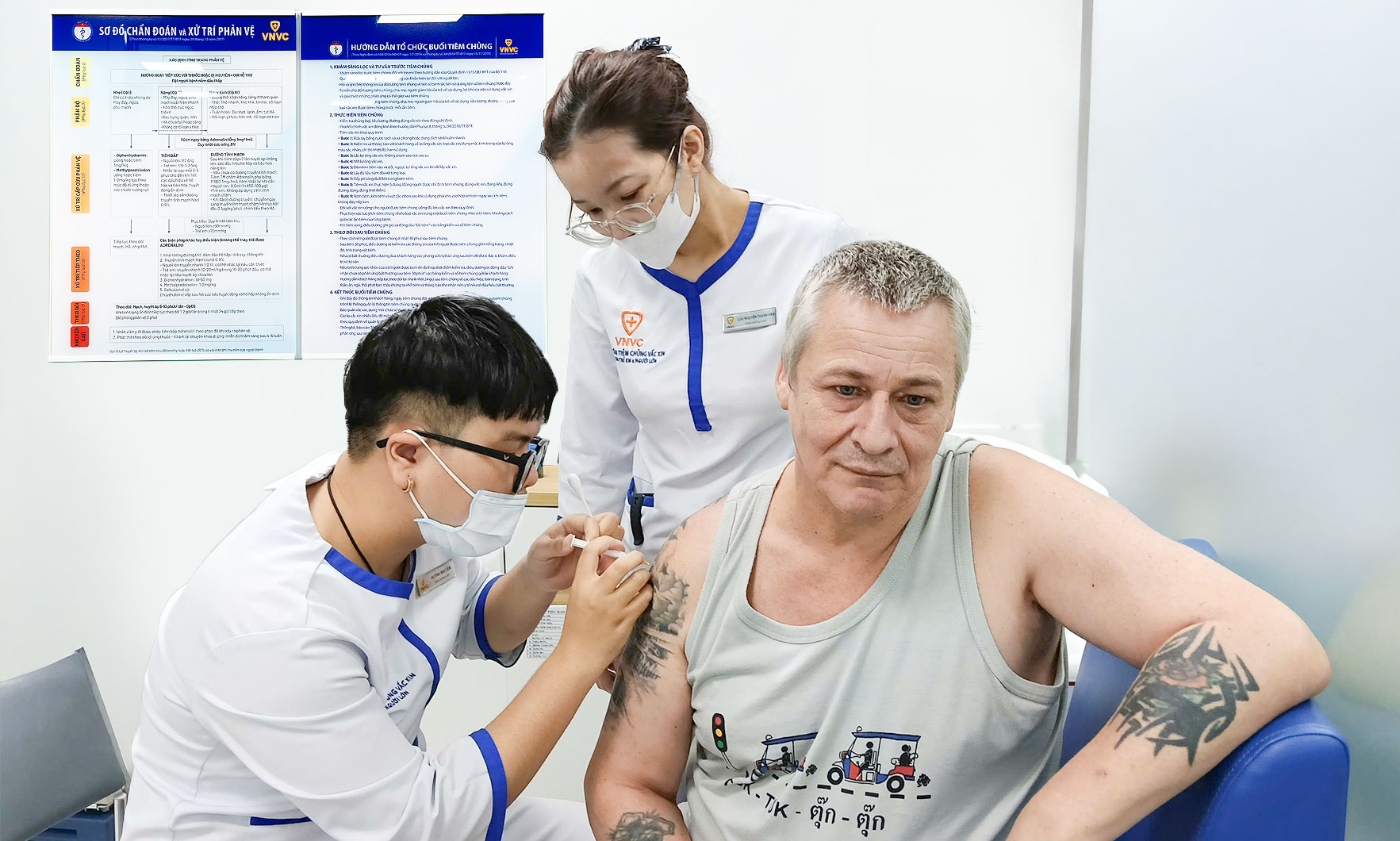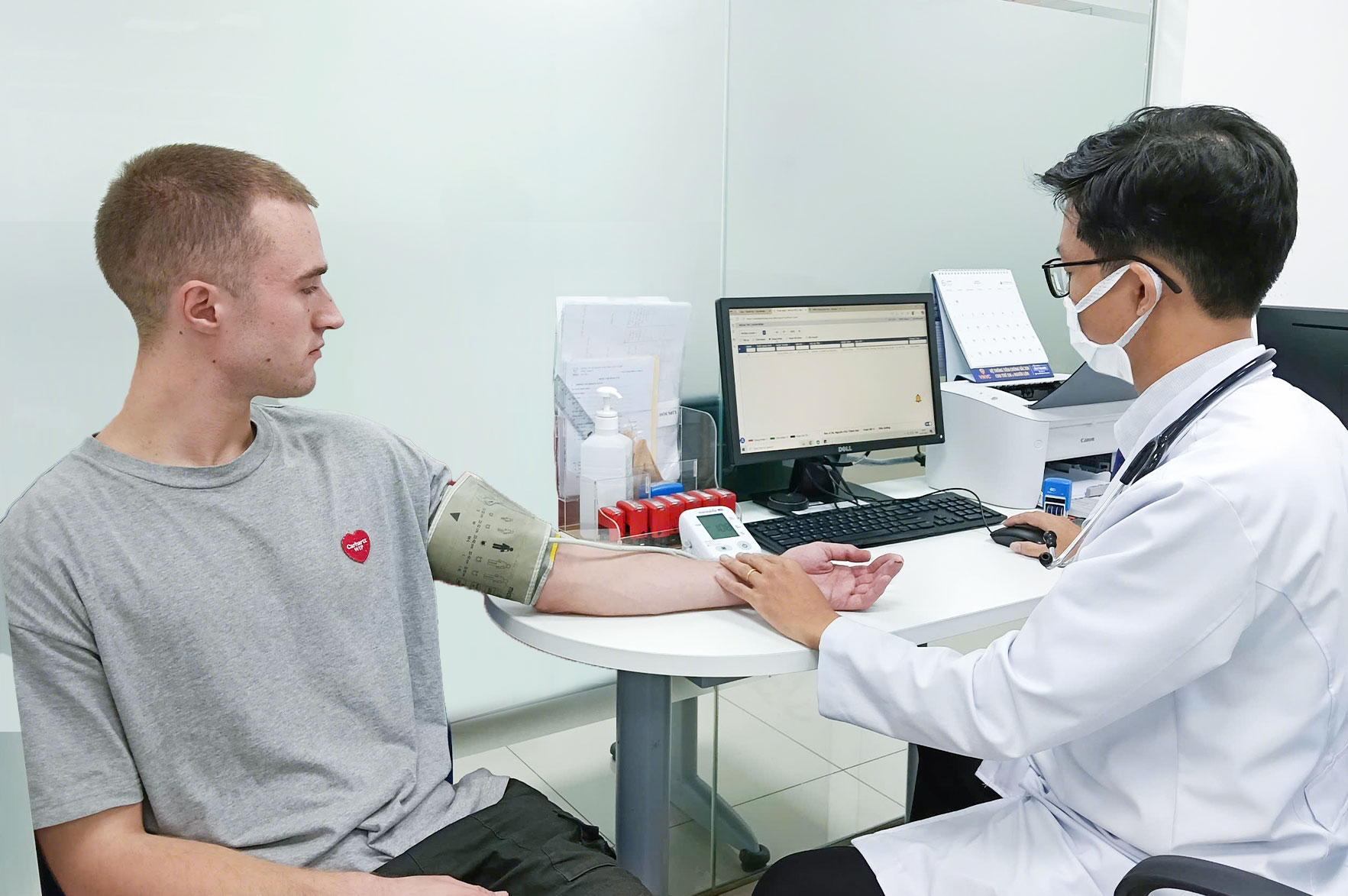The 58-year-old said he has been traveling in Vietnam for about 6 months and plans to go to South America in August. As usual, before each trip, Simon researches the disease situation in his destination country to get vaccinated and protect his health.
In the UK, the distance to vaccination centers and long waiting times prevented him from getting fully vaccinated. Therefore, upon arriving in Vietnam, he researched and visited the VNVC vaccination center in District 1 (Cau Ong Lanh ward, Ho Chi Minh City) to complete his vaccinations. He chose typhoid and rabies shots, and oral cholera vaccine.
The British tourist explained he had been vaccinated against cholera and typhoid 4 years ago and wanted booster shots. The rabies vaccine is a preventive measure, offering additional safety in case of attacks by dogs, cats, or wild animals.
"The vaccination center is very close to my hotel, so it's quite convenient. Although my country doesn't require these vaccines, I proactively chose to get them for peace of mind, as I'm unsure about the situation there," Simon said.
 |
Hartley receives a pre-exposure rabies vaccine at VNVC. Photo: Hoang Duong |
Hartley receives a pre-exposure rabies vaccine at VNVC. Photo: Hoang Duong
Later that day, 26-year-old Harvey Boxwell, also from the UK, visited the same VNVC center for a rabies vaccination. He explained he was bitten by a dog while traveling in Cambodia and had received two doses of the vaccine on days 0 and 3 there. He continued his remaining doses in Vietnam.
Doctor Nguyen Huu Thanh Dat, head physician at the VNVC vaccination center in District 1, said the center regularly sees international travelers coming for vaccinations. They come from various countries, including the UK, US, Canada, France, Netherlands, Germany, South Korea, and Japan.
According to Dr. Dat, many countries now control rabies in domestic animals like dogs and cats, resulting in many travelers not having prior rabies vaccinations. During their travels, studies, or work trips, especially to tropical countries, they may be exposed to rabies and therefore seek vaccination. Additionally, many people choose pre-exposure prophylaxis before any animal bites or scratches.
"VNVC has seen many tourists coming to our center for rabies vaccinations. Many of them have been bitten by dogs, and some by cats and monkeys," Dr. Dat said.
 |
Dr. Dat examines and advises the British man. Photo: Hoang Duong |
Dr. Dat examines and advises the British man. Photo: Hoang Duong
Rabies is an acute viral infection of the central nervous system, transmitted from warm-blooded mammals such as dogs, cats, monkeys, bats, and wild boars to humans through secretions, primarily saliva, from bites, scratches, or licks on mucous membranes or open wounds.
According to the WHO, rabies is widespread across all continents except Antarctica. Each year, around 59,000 people die from rabies, 95% of which are in Asia and Africa, and over 29 million people receive rabies vaccines. There is currently no treatment for rabies; once symptoms appear, the mortality rate is almost 100% for both humans and animals.
Dr. Dat advises that if bitten, scratched, or licked on an open wound by a warm-blooded mammal, the wound should be washed with soap and water for 15 minutes. The wound should be disinfected with 70% alcohol or iodine solution, and the individual should visit the nearest vaccination center. Doctors will assess the wound and administer rabies vaccine, rabies immunoglobulin, and tetanus vaccine if necessary. If someone has already received the full 3-dose pre-exposure prophylaxis, they only need two additional vaccine doses, not immunoglobulin.
People should avoid squeezing blood, rubbing the wound vigorously, or applying traditional herbal remedies to prevent infection and faster viral spread.
Dr. Dat added that foreign visitors to VNVC are very concerned about their health and well-being. They thoroughly research vaccine information. Besides rabies, they often get vaccinated against cholera, typhoid, hepatitis A, hepatitis B, and Japanese encephalitis. He also recommends that Vietnamese people, before traveling, working, studying, or working abroad, should research disease outbreaks in their destination countries and proactively get vaccinated. Alternatively, they can visit the nearest vaccination center for advice on a suitable vaccination schedule based on the local epidemiology.
An Duong












